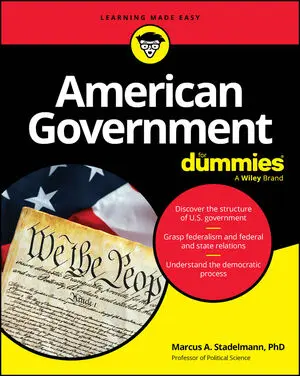This builtin is not currently supported: Animation
- Book & Article Categories

- Collections

- Custom Solutions
 Main Menu
Main MenuBook & Article Categories
 Main Menu
Main MenuBook & Article Categories
Marcus A. Stadelmann
Marcus A. Stadelmann, PhD, is a professor of political science and chair of the Department of Political Science and History at the University of Texas at Tyler. Along with teaching at universities in California, Utah, and Texas, Dr. Stadelmann has published and given presentations in the fields of American politics and international relations.
Articles & Books From Marcus A. Stadelmann
A source of unbiased, factual information on the U.S. government American Government For Dummies helps you easily understand the concepts and historical events that define the U.S. government system. This readable guide covers all the content in a typical course on American government or civics, and it offers curious readers a way to learn more about how the country is run.
Article / Updated 08-10-2023
From the beginning, the Trump administration was mired in scandals that have undermined his presidency. The constant wave of scandals has resulted in negative coverage of his presidency, overshadowing his economic and foreign policy successes.Instead of being able to focus on domestic and foreign policy, President Trump has constantly dealt with putting out fires often caused by his own actions.
Cheat Sheet / Updated 06-21-2023
This Cheat Sheet focuses on 50 key dates in the history of first ladies of the United States. These events mark the unique and continuing evolution of the office of First Lady and the first ladies themselves. ©Library of Congress, Prints & Photographs DivisionJacqueline Lee Bouvier KennedyEvents during the 1700s and 1800sJune 3, 1781: Martha Jefferson dies.
Article / Updated 06-06-2023
Today, the president performs many roles in society. The president has become the preeminent politician in the United States. Some of his presidential duties and roles include:
Head of state: The president symbolizes the United States. Other countries judge the United States by what kind of president the U.
Article / Updated 05-03-2023
President Donald Trump has been known for being controversial at home and abroad. Take a brief look at how these controversies helped shape Trump’s presidency.
Being Controversial at Home
Controlling both houses of Congress, Trump tried to move quickly to have his agendas secured. However, he became frustrated with how slowly Congress operates and has relied heavily on executive orders to implement or change policies.
Article / Updated 12-23-2022
Political science is the study of power. The discipline is enamored with the concept of power, namely how A gets B to do what A wants. Therefore, political science studies who holds power and how it’s being used.Political power is the ability to get others to do what you want. It can take force or peaceful means, such as persuasion, to achieve this.
Cheat Sheet / Updated 02-24-2022
From early Greek political philosophy to current international conflicts, political science is a study in how people come together, interact, become informed, and make decisions that affect everyone. Studying political science allows you to become educated on political issues, make decisions, and discover how politics is made at the local, national, and international level.
It's time for the ladies—the First Ladies, that is—to get their time in the spotlight What does a First Lady do? What makes a First Lady successful? If you've always wanted to know, this is the place to come to for the answers! This reference has the inside scoop on all the First Ladies, including Michelle Obama's campaigns for healthy eating and Jackie Kennedy's emphasis on art and culture.
Cheat Sheet / Updated 03-14-2021
Over the last 231 years, 44 men have dominated U.S. politics and history. Although almost every American can name the current president, less than half can tell you the name of the vice president or the Senate majority leader. No other office within the U.S. government has received as much attention as the presidency.
Expand your political science knowledge with a book that explains concepts in a way anyone can understand! The global political climate is dynamic, at times even volatile. To understand this evolving landscape, it’s important to learn more about how countries are governed. Political Science For Dummies explores the questions that political scientists examine, such as how our leaders make decisions, who shapes political policy, and why countries go to war.






